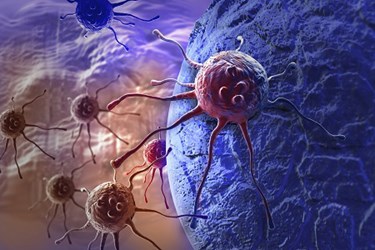Researchers Develop New Anticancer Peptide Vaccines and Inhibitors
By C. Rajan, contributing writer

Two new anticancer peptide vaccines and two peptide inhibitors have been developed by researchers at The Ohio State University Comprehensive Cancer Center as part of a larger peptide immunotherapy project.
The four agents, which target the HER-3 and IGF-1R receptors, were designed to treat breast, pancreas, esophagus, and colon cancer, and all showed significant anti-tumor responses in human cancer cell lines and in animal models.
The IGF-1R (insulin-like growth factor receptor 1R) is involved in cell growth, proliferation, differentiation, and development, and is overexpressed in breast, pancreatic, esophageal, and colon cancers. On the other hand, the HER-3 (human epidermal growth factor receptor 3) is upregulated in cancers that overexpress HER-1 (EGFR) and HER-2.
“We believe that blocking HER-3 might provide a route for overcoming resistance to agents that target HER-1 or HER-2,” says Pravin Kaumaya, PhD, principal investigator and director of the division of vaccine development.
When injected in animal models, the two peptide vaccines elicited antibodies which: (a) inhibited cancer-cell proliferation and receptor activation, (b) induced cell death by apoptosis and antibody-dependent cellular cytotoxicity, and (c) significantly inhibited tumor growth. The two peptide inhibitors also showed the same effects in animal models.
“We believe that our novel immune-stimulatory strategies using peptide vaccines and inhibitors hold the promise of durable clinical benefit for high-risk, recurrent, refractory and metastatic cancers,” Dr. Kaumaya says.
The researchers used several cancer cell lines (two breast, TNBC, colon, and pancreatic) and two animal models in the study to evaluate the effectiveness of the HER-3 and IGF-1R inhibitors alone, and in combination with HER-2 and EGFR. They discovered that combining two peptide agents targeting different cell receptors could boost their effectiveness, and could possibly prevent the drug resistance observed with standard single-drug treatments that target HER-2. The study reports that:
- Combining the HER-3 vaccine and IGF-1R inhibitor reduced cancer-cell proliferation two-fold compared to the individual agent alone.
- Combining these new agents with HER-1 and HER-2 vaccines developed earlier showed synergistic antitumor responses.
- Combining HER-3 with IGF-1R showed significant antitumor effects in breast, pancreatic, and colon cancers.
- Combining HER-1 vaccine and IGF-1R vaccine showed enhanced antitumor responses in triple-negative breast cancer and pancreatic cancer.
“Combining these novel immunotherapy peptides could significantly improve response rates and rates of durable remissions for the multiple types of cancer that depend on EGFR, HER-2, HER-3, or IGF-1R signaling,” says Dr. Kaumaya.
The discoveries have been reported in two studies that were published in the journal OncoImmunology.
